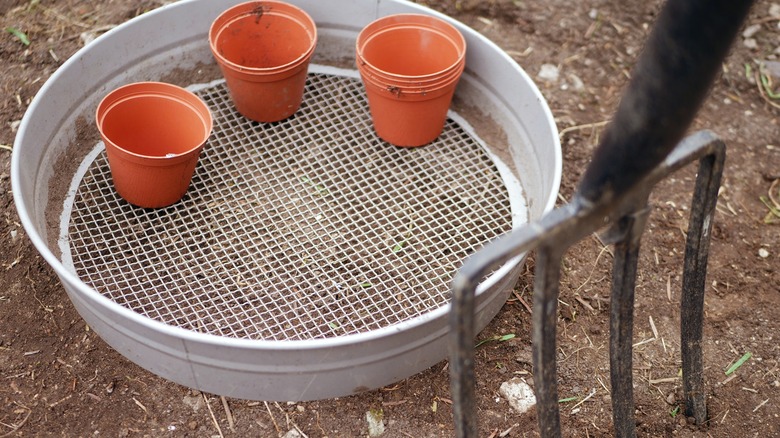In theory, gardening can and should be simple and affordable. Sometimes though, it seems like there are so many different and useful gardening tools that you’ll never have the money or storage space for them all. Luckily, TikTok comes through for us once again, this time with a hack shared by @5.min.green about how to temporarily transform your pitchfork or gardening fork into a garden sieve.
A good quality gardening fork, also known as a spading fork, is one of the most useful tools you can have in the garden. It can be used for mixing different growing media, for loosening compacted soil, and even for removing the rhizomes of pesky weeds. Spading forks are similar to pitchforks but have shorter and thicker tines, making them better suited for moving heavier material. With the clever addition of zip ties and mesh screens, pitchforks and garden forks can also become temporary sieves.
How to make a DIY garden sieve
Transform your rake to a filter #planttok #greentok #gardeningtips #gardening
♬ original sound – 5-Minute Green – 5-Minute Green
Watch on TikTok
While gardening sieves, sometimes called riddles, can be purchased at most home improvement stores, they can also be easily made with things you may already have around the house. This DIY sieve can also be easily taken apart for convenient storage. To construct your sieve, cut a piece of screen or hardware cloth to the length and width of your fork’s tines or prongs. Consider duct-taping the perimeter of the piece of screen to cover the sharp edges. Then secure the hardware cloth to the fork using four zip ties. You can also make a miniature sieve by attaching hardware cloth to a small hand fork using the same zip tie method.
The ideal mesh size depends on what you plan to use your sieve for. A screen with mesh holes in the range of ½ inch could be ideal for removing small rocks, while a screen with a mesh size closer to ¼ inch could be better for screening compost. Another convenient aspect of this hack is how quickly and easily you can change the screen size — you can just cut the zip ties and switch out the screen for one with a smaller mesh diameter.
Why sieves are useful in the garden

Sieves, either homemade or store-bought, can be game changers in the garden. A sieve is perfect for removing rocks and other debris from a new garden bed or landscape. It can also make an ideal compost sifter. Sifting compost not only removes any plastics, rocks, or other inorganic material that ended up in the bin by accident, but it also helps separate finished compost from undecomposed material that needs more time.
A finer mesh also has its uses on sieves. Compost that has been finely sifted can be more easily added to lawns without smothering the grass. Michigan State University Extension’s homemade seed starting mix also uses sterile finely sifted compost combined with peat moss or coco coir and vermiculite. A fine mesh can also be useful for seed saving. In addition, seeds surrounded by a fleshy pulp can be cleaned on a sieve. Just use a hose or your gloved hand to help the fruit loosen from the seeds.